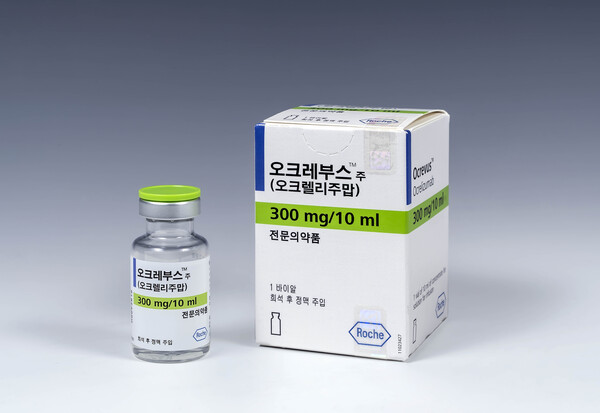Roche Korea said its multiple sclerosis (MS) treatment, Ocrevus (ingredient: ocrelizumab), started receiving reimbursement from last Saturday.

Ocrevus is a humanized monoclonal antibody that selectively targets CD20-expressing B cells, which are implicated in the demyelination process of multiple sclerosis. It is administered via intravenous infusion twice a year, reducing the treatment burden for patients by minimizing hospital visits while ensuring high adherence and persistence.
With this reimbursement approval, Ocrevus is now covered as a monotherapy for patients with relapsing forms of multiple sclerosis (RMS), including relapsing-remitting multiple sclerosis (RRMS) patients who failed or showed insufficient response to first-line treatments such as interferon β-1b and are eligible for outpatient treatment, as well as secondary progressive multiple sclerosis (SPMS) patients, where Ocrevus is recognized as a first-line treatment.
RMS includes both RRMS and SPMS. RRMS is the most common form of multiple sclerosis, characterized by repeated episodes of relapse and remission. Approximately 85 percent of MS patients are initially diagnosed with RRMS.
If left untreated, the majority of these patients eventually transition to SPMS, experiencing progressive neurological disability. Thus, a key treatment goal for MS is to suppress disease activity early and slow the progression of disability.
The reimbursement decision was based on robust clinical data, including the results from the large-scale global phase 3 OPERA I and II trials and a 10-year follow-up from open-label extension studies.
In OPERA I and II, Ocrevus reduced the risk of confirmed disability progression (CDP) by 40 percent over 12 weeks compared to the control group, maintaining this effect for 24 weeks. It also significantly lowered the annualized relapse rate (ARR) by nearly 50 percent and reduced the number of brain lesions observed on MRI scans, demonstrating its clinical efficacy.
The long-term efficacy of Ocrevus has been maintained for 10 years. A 10-year follow-up analysis from the OPERA I and II open-label extension study showed that patients continuously treated with Ocrevus experienced a sustained reduction in ARR, with a 10-year ARR of 0.017, equivalent to one relapse in approximately 60 years.
Also, 77 percent of RMS patients who received Ocrevus for a decade showed no disability progression, and 92 percent retained independent walking ability without assistive devices.
Notably, patients who started Ocrevus treatment early in the clinical trials demonstrated more effective disease control and a lower risk of disability accumulation compared to those who initiated treatment later.
Patients who began Ocrevus two years earlier could delay disease progression by nearly a decade. The difference in disability accumulation between early and late starters remained significant over 10 years. Additionally, no new adverse events or unexpected safety concerns were observed in patients treated with Ocrevus over a decade, confirming its favorable safety profile.
“The treatment of multiple sclerosis has recently shifted toward a ‘highly effective early treatment strategy’ that actively prevents disability from the initial stages using high-efficacy drugs,” Professor Kim Ho-jin of the Department of Neurology at the National Cancer Center said. “However, the domestic usage rate of high-efficacy drugs remains at around 22 percent, indicating a significant unmet need.”
With the reimbursement of Ocrevus, the range of high-efficacy treatment options has expanded, allowing more patients to prevent disease progression and disability from the early stages effectively, ultimately improving treatment outcomes, Kim added,
Roche Korea General Manager Izat Azem also said, “With this reimbursement, we expect to enhance treatment accessibility for Korean patients with relapsing multiple sclerosis and provide the proven therapeutic benefits of Ocrevus, supported by extensive clinical data and prescribing experience, to a broader patient population.”
Related articles
- Celltrion's 2024 revenue hits record high on blockbuster drug growth, portfolio expansion
- Pfizer's AML drug denied insurance coverage; Roche, Lilly face conditional reimbursement for MS and ulcerative colitis treatments
- Roche Korea and HK inno.N form partnership for Avastin promotion
- Roche’s Vabysmo expands indication to retinal vein occlusive macular edema
- Roche Korea and Nucleate collaborate to nurture biotech talent
- Roche flags APAC vision crisis as Korea sees rise in eye disease from aging, diabetes
- Korean approval imminent for Ocrevus SC injection for multiple sclerosis
- Roche Korea wins approval for breast cancer drug targeting PIK3CA-mutated HR+ HER2- patients

